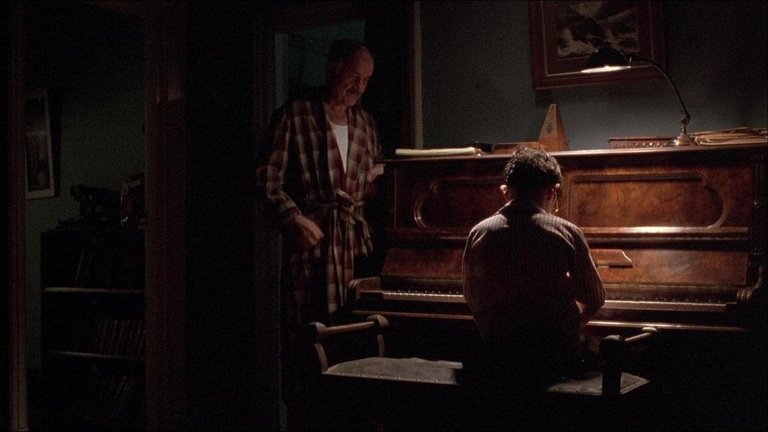Retro Film Review: Shine (1996)

"It's that time of the year" was the first thought that crossed my mind when I heard about Shine, 1996 Australian drama directed by Scott Hicks. In USA the film was released at the end of year, in a time when major studios launch their "Oscar" hopefuls -films carefully designed to appeal to biases of AMPAS voters. Today that film is best remembered for the very thing it was tailored for – winning Academy Award for Best Actor. It is doubtful that it would be remembered for anything else.
Shine is the true story of David Helfgott (played by Geoffrey Rush), one of Australia's greatest modern-day pianists. At the beginning of the film we encounter him as nothing more than mentally disturbed, albeit harmless, middle-aged man. But when he touches piano, it turns out that the madness didn't impede his musical talent. Through flashbacks the film shows how he descended to such sorry state. Young David (played as child by Alex Rafalowicz) grew up in the family of Peter Helfgott (played by Armin Mueller-Stahl), Jewish immigrant who had survived Holocaust. Peter's bitter experiences led him to nurture competitiveness and talent in his children, but also made him over-protective to the point of cruelty. When musically talented David becomes adolescent (played by Noah Taylor) he gets opportunity to continue his education, but his father doesn't want to see him leave home. Conflict erupts and David finally leaves for London, but the psychological aftermath of his decision makes that victory Pyrrhic. He suffers mental breakdown and spends decades in institution. When he finally gets out strange twist of events would allow him to get life back into some kind of order.
Shine has everything a standard "Oscar" hopeful should have. The protagonist is affected by debilitating mental or physical condition that makes his contact with outside world difficult. The story ends on uplifting note, showing how such individuals can overcome their difficulties. All of the protagonists' problems are, in one way or the other, explained by childhood traumas, and Academy voters - conditioned by decades of being subjects to Freudian psychoanalysis - would feel empathy to his plight. Even some Holocaust is thrown for good measure, and the film based on true story is just icing on the cake.
No matter how obvious it is, "Oscar" formula isn't the main problem of Shine. Actually, some of those story elements work to film's advantage. We may argue that Geoffrey Rush perhaps didn't deserve Academy Award, but only because his talent is overshadowed by Armin Mueller-Stahl and young Noah Taylor. The problem of the film is in Jan Sardi's script. Basically, the most interesting, most well-written and well-acted part of the film is the section that describes Helfgott's traumatic childhood and his conflict with the father. As soon as young David leaves family and goes to London, the main dramatic conflict is resolved. What follows is incoherent, not particularly interesting nor convincing display of the psychological aftermath. Because of that, Shine looks like unfinished work and all those viewers who expect films to be more than great acting are going to be disappointed.
RATING: 4/10 (+)
(Note: The text in its original form was posted in Usenet newsgroup rec.arts.films.reviews on October 21st 2003)
==
Blog in Croatian https://draxblog.com
Blog in English https://draxreview.wordpress.com/
Cent profile https://beta.cent.co/@drax
Minds profile https://www.minds.com/drax_rp_nc
Uptrennd profile https://www.uptrennd.com/user/MTYzNA
Brave browser: https://brave.com/dra011
BTC donations: 1EWxiMiP6iiG9rger3NuUSd6HByaxQWafG
ETH donations: 0xB305F144323b99e6f8b1d66f5D7DE78B498C32A7